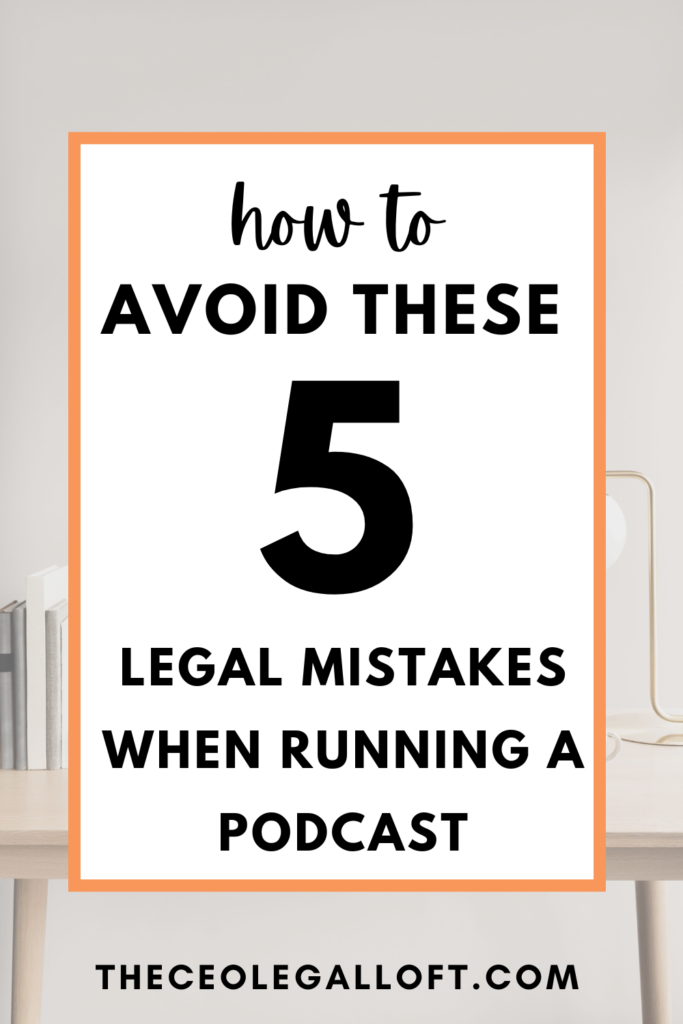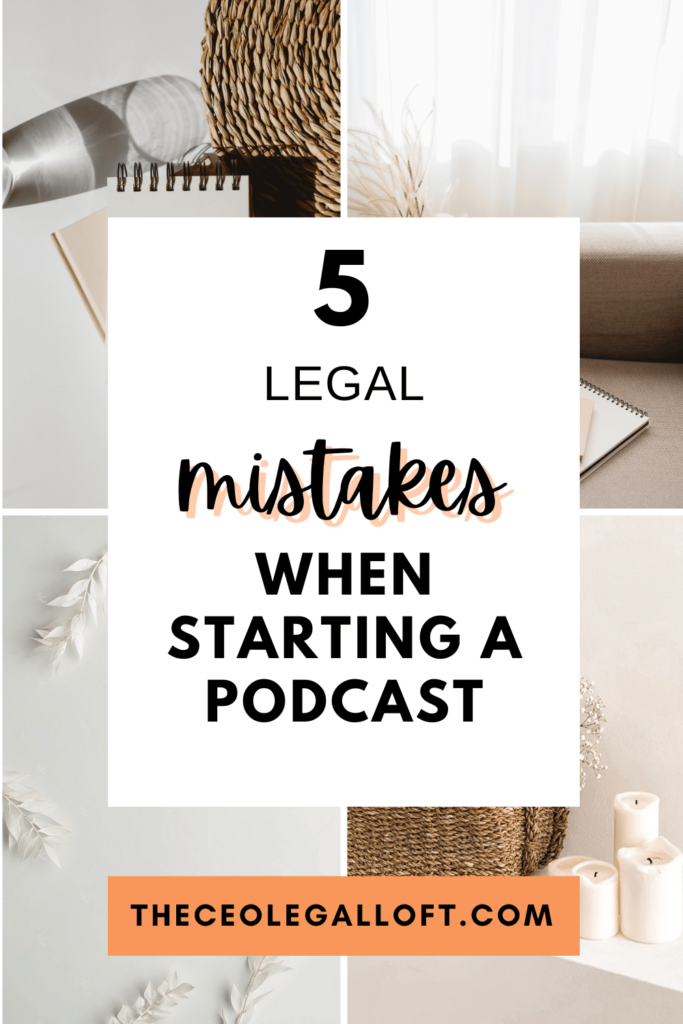In today’s digital age, podcasts are more popular than ever. In fact, there are 464.7 million podcast listeners globally. From captivating stories to insightful interviews, podcasts provide a platform for diverse voices and intriguing conversations. As a podcast host or an online business owner, you’ve likely experienced the excitement of sharing your content with the world. But with this exciting endeavor comes a crucial aspect many tend to overlook – understanding the legal landscape of podcasting. This blog post aims to shed light on some of the major podcast legal issues you should be aware of so you won’t be held liable for these legal issues.
Infringing on copyrighted works
Let’s start with a topic you might’ve heard about but might not fully understand – copyright laws. In simple terms, copyright law is a type of intellectual property designed to protect original works of authorship. This can range from books and movies to songs and, yes, podcasts.
So, how do copyright laws apply to podcasting? Here’s a typical scenario: You’ve found the perfect song to use as your podcast’s intro. It’s catchy, it suits your theme, and you know your listeners will love it. Easy decision, right? Not quite. If the song is protected by copyright, using music without getting permission or licensing could land you in legal hot water.
To avoid such copyright issues, consider the following tips:
- Always seek permission before using someone else’s work. This includes music, snippets of other podcasts, or even readings from a book.
- Consider using royalty-free or Creative Commons music. Many sites offer music that’s free to use with certain conditions.
- Remember, just because content is on the internet doesn’t mean it’s free to use. Be sure to verify the copyright status before including it in your podcast.
- Purchase a commercial license for any music that you’d like to use on the podcast
What other copyright issues will you face while running a podcast?
- Using copyrighted images for podcast covers or website content: Similar to music, using copyrighted images without proper permission can lead to legal trouble. Podcasters should use royalty-free images or obtain the necessary rights for the images they use.
- Quoting copyrighted material without attribution or exceeding fair use: While quoting a small portion of a copyrighted work for criticism, comment, news reporting, teaching, scholarship, or research can qualify as fair use, excessive quotation or use without attribution can still lead to copyright infringement.
- Featuring guests who play copyrighted music or read from copyrighted works: Even if the host isn’t the one infringing, they can still be held responsible if a guest infringes copyright during the show.
- Using copyrighted content believing it’s covered by ‘Fair Use’: The concept of ‘fair use’ is often misunderstood. It’s not a right but a legal defense, and what qualifies as fair use can be ambiguous. When in doubt, it’s best to seek permission.

Performing Defamation and Libel
A podcasting legal mistake you’ll want to avoid is performing defamation and libel. Defamation includes any false statement that harms the reputation of an individual. When this defamation is spoken (or in our case, recorded and published in a podcast), it’s termed as slander. If it’s written, printed, or broadcasted, it’s known as libel.
When hosting a podcast, especially those involving commentary or reviews, it’s crucial to distinguish between sharing an opinion and potentially defamatory statements. Here’s 5 distinctions between sharing an opinion and defamatory statements.
- Factual Basis: Opinions are typically based on subjective thoughts, and cannot be proven true or false. Defamatory statements are presented as facts and can be proven false. However, an opinion that implies false facts can still be defamatory.
- Clear Indication: Make sure to clearly indicate when you’re expressing an opinion. Phrases such as “in my opinion” or “I believe” can help clarify this.
- Basis in Truth: Even if you’re stating an opinion, make sure that it is based on truth. Making derogatory statements based on incorrect information can still lead to defamation claims.
- Public Figures vs. Private Individuals: Courts tend to protect opinions about public figures more than those about private individuals. However, this doesn’t mean that you can make unfounded negative statements about public figures without consequences.
- Malice: If a statement is made with actual malice (knowing it’s false or with reckless disregard for the truth), it may be considered defamatory, even if it was presented as an opinion.
Critiques and negative reviews are fine, but ensure you’re not spreading false information that could damage someone’s reputation. When in doubt, it’s better to err on the side of caution.
Sponsorship and Advertising Laws: The Importance of Transparency
In the world of podcasting, sponsorships and advertising can be significant sources of revenue. However, it’s essential to understand and follow the laws concerning disclosure. In many jurisdictions, authorities like the Federal Trade Commission (FTC) in the United States require podcasters to clearly disclose their relationships with sponsors.
What is a Disclosure?
A disclosure is a statement that informs listeners about the relationship between the podcaster and the sponsor or advertiser. It’s a way to let listeners know that you are being compensated for endorsing a product or service, or that you might receive an affiliate commission for sales made through a link you share.
Why are Disclosures Important?
Disclosures are vital for maintaining trust with your audience. They show that you are being upfront about your relationships with advertisers or sponsors. Additionally, they help listeners discern advertising from unbiased content.
More importantly, disclosures are a legal requirement. They protect consumers from misleading advertising and are enforced by regulatory bodies. Failing to include adequate disclosure could lead to penalties and damage to your reputation.
How to Provide Effective Disclosures
- Clear and Conspicuous: The disclosure should be easily understood by the average listener and hard to miss. It needs to be in clear language and prominently placed. If you’re mentioning it in your audio content, make sure it’s spoken clearly and slowly enough to be understood.
- Before the Recommendation: Ideally, disclosures should occur before the endorsement or recommendation of the product or service. Listeners should know about the relationship before they hear your endorsement.
- In Each Episode: If you have an ongoing relationship with a sponsor, you need to include a disclosure in each episode where you mention them, not just the first one.
- Avoid Jargon: Use plain language that your listeners will understand. Avoid legalese or industry jargon.
To stay on the right side of the law, always be transparent about your affiliations. Remember, when it comes to disclosures, the rule of thumb is when in doubt, disclose.

Privacy Issues: Respecting Boundaries in Your Podcast
Privacy laws protect a person’s personal information from the public. Basically, you can’t put someone out on a public platform without permission. When it comes to podcasting, these laws become crucial if you’re dealing with sensitive topics or personal stories. Before broadcasting any personal information, it’s not just polite, but legally necessary to get permission from the individuals involved if you don’t want someone to bring a lawsuit.
This is where the concept of a release form comes into play. A release form is a legal document where the person being recorded (or whose story or data is being shared) gives you permission to use their voice, image, or information. It protects you from potential legal issues, such as invasion of privacy, defamation, or misappropriation.
Here’s how you go about getting a release:
- Draft a Release Form: While there’s no one-size-fits-all format, it should generally include the identification of parties involved, scope of the release, duration and geographical scope, the purpose for use, an agreement not to sue, and any compensation or consideration.
- Explain the Release Form: Make sure your guest understands what they’re agreeing to. Present them with the form, explain its contents, and ensure they’re comfortable with the terms.
- Obtain Signature: Once the guest understands the release form, have them sign and date it. Keep a copy of the signed forms for future reference.
Keep in mind, it’s always advisable to consult with a lawyer when drafting a release form to ensure it’s enforceable under your jurisdiction’s laws.
In addition, be mindful of recording laws. In some jurisdictions, it’s illegal to record a conversation without the consent of all parties involved. Always get the necessary permissions before hitting the record button.
Bonus: Not registering the name of your podcast with the United States Patent & Trademark Office (USPTO)
Not registering the name of your podcast with the United States Patent & Trademark Office (USPTO) can be a costly mistake. Without this official registration, you have no legal protection for your podcast name and someone else could easily use it for their own show. This could lead to confusion among your audience and potential loss of your brand identity.
Registering your podcast name with the USPTO provides you with exclusive rights, ensuring that no one else can use the same name for a similar type of podcast or related services. It also allows you to take legal action against anyone who tries to infringe upon your trademark. Additionally, having a registered trademark can give your podcast a sense of credibility and professionalism. It shows that you are serious about your brand and willing to defend it. That’s why taking the time to register your podcast name with the USPTO is a necessary step to protect your intellectual property and establish a strong presence in the podcasting industry.
Conclusion: Navigating Podcast Legal Issues
So, there you have it – a whirlwind tour through the sometimes tricky, always important, world of podcast legal issues. With copyright, privacy, defamation, and advertising rules – it’s a lot to take in.
But don’t fret. While this all might seem daunting, it’s just part of the journey. The key is not to become a legal expert overnight, but to be aware of these areas, so you can navigate them and ask for help when needed. It’s about making sure your podcast isn’t just great to listen to, but also on the right side of the law.
And remember, this guide is just a starter. Laws can differ wildly depending on where you are, what your podcast is about, and so many other bits and pieces. When in doubt, don’t be afraid to reach out to a lawyer who can give you the low-down for your specific situation.
At the end of the day, all these legal hoops are there to help protect you, your listeners, and your podcast. With them in mind, you can focus on the fun part: hitting the mic and creating a show that resonates with your audience.
________________
Thinking about featuring a guest on your podcast? Be sure to protect both of you with a podcast guest release. This little document forms a clear agreement between you and your guest, covering all the bases – use of image, name, voice, and more. Plus, it places the responsibility of their statements squarely on their shoulders and gives you the green light to edit, distribute, and monetize the episode. So, before you hit record, make sure you’ve got that release signed and understood. It’s your best defense against potential legal hiccups down the road.

+ show Comments
- Hide Comments
add a comment